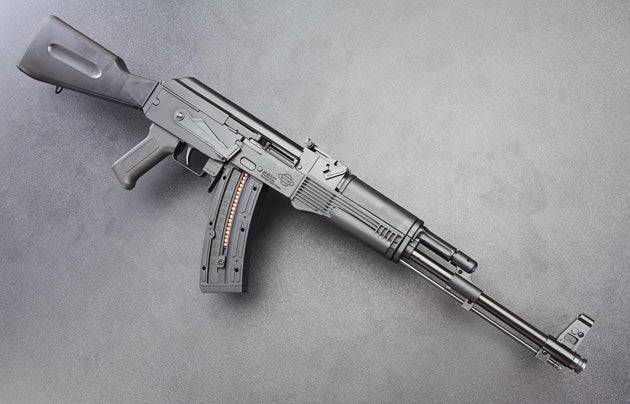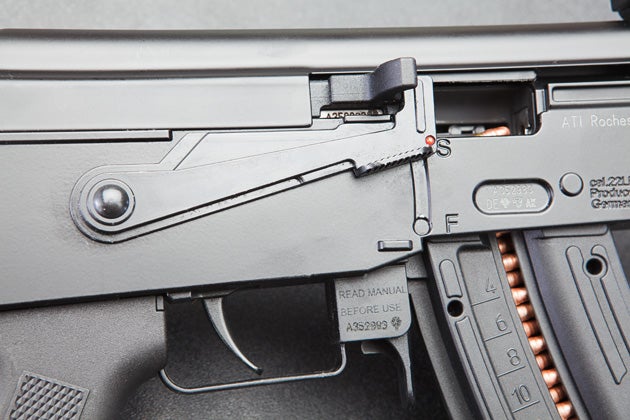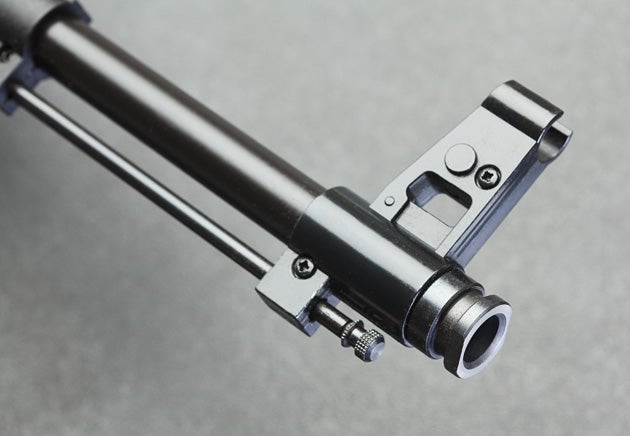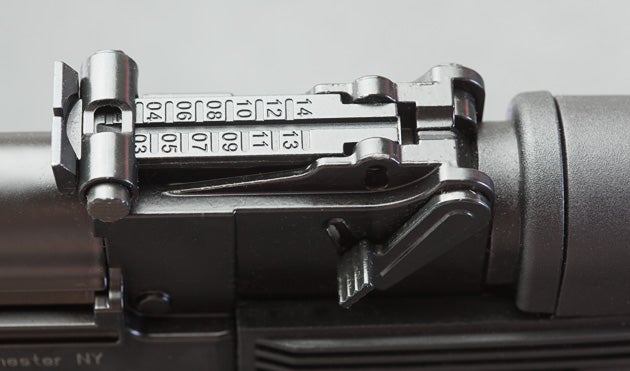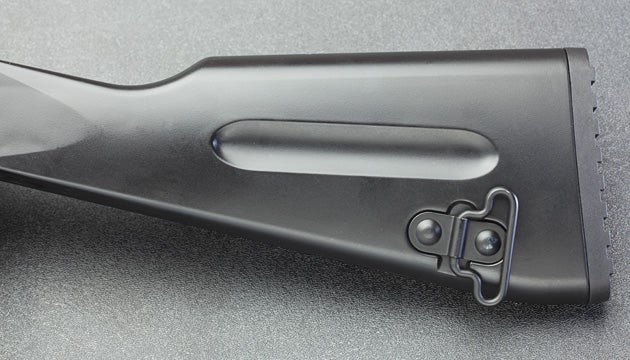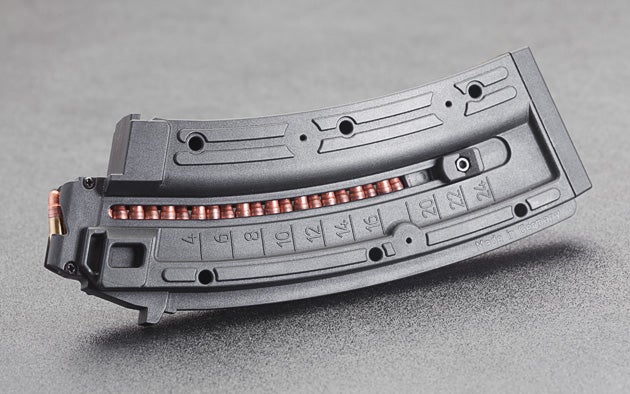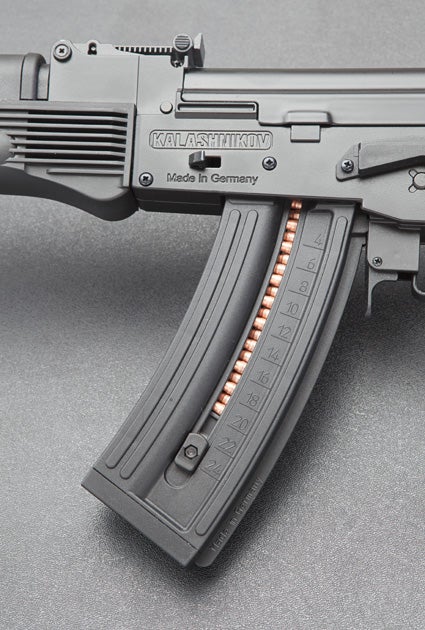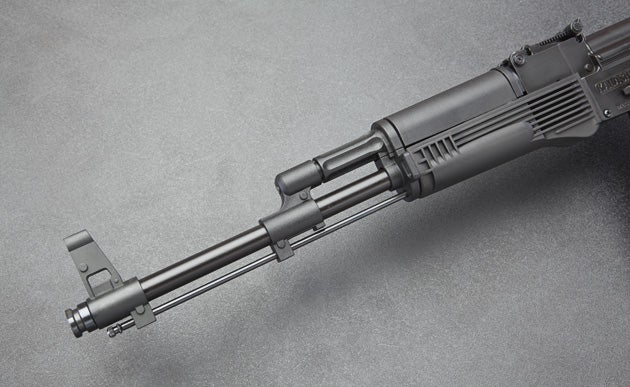AK-47 experience minus the recoil
Oleg Volk 09.24.13

When I got my first 7.62×39 rifle, an SKS, the low cost of ammunition was one of main attractions. Surplus went for a dime per round and was easily available. I later added AKs to the safe motivated by the same: ammunition was available and sturdy magazines cost a small fraction of AR15 30-rounders. The circumstances have changes a little since then. A single round of 7.62×39 ball now runs from 30 to 60 cents. While .308 is even more expensive, most of the training with precision rifles emphasizes accuracy, while AK47 clones were primarily intended for maneuver by fire. Training with them reflects this and most courses specify 400-600 round minimums.
GSG AK47-22 currently imported by ATI is the logical offering for the training market. Designed to mimic controls and overall feel of the 7.62 and 5.45 AK rifles, it appeals most to those who train CQB extensively and burn up significant amounts of ammunition in the process. However scarce and expensive 22LR has recently become, it is still far more affordable than centerfire ammunition. Rimfire ammunition also erodes range backstops substantially less, allowing indoor carbine training at pistol-only facilities.
At first glance, the open-sided magazine holding 24 rounds is the only part that indicates that this rifle is a rimfire clone of the AK. Looking more closely, we can see a modified safety lever with a bolt hold-open notch. While this modification is common on AKs, this rifle also holds the bolt open on the last shot and retains that lock-back even after the magazine is removed.
Removing the magazine disables the rifle, thanks to the so-called “magazine safety” which is entirely out of place on it. The rest of the gun looks and feels like a real AK, though the felt recoil is much lower, even less than with 5.45×39 variant.
The muzzle of the barrel tube — the barrel itself is hidden within — is threaded for accessories like flash hiders and sound suppressors. Front sight adjusts for elevation the same as the centerfire equivalent but lacks any provision for changing windage. The rear sight is the same as the original, with a slider for range adjustment. If the rifle does not shoot to point of aim with your chosen ammunition, the windage can be adjusted by taking a fine file to the rear sight notch to widen it.
For precision shooting to the extent that the 3-4MOA design permits, the side rail supports Russian-style sidemount optics or a Picatinny adapter. The top handguard comes off the same way as the gas tube does on the original and several aftermarket forends fit it.
The trigger is very similar to a good AK, and the flapper magazine latch works identically to the real thing. The carbine has the same balance and similar weight to the original. The same slings fit it.
The open-sided magazine is a concession to the realities of range use: we spend much more time loading magazines than splashing in the mud. However, the sides can be covered with tape to keep out the dirt on field exercises. The magazine is very well designed and functioned with a wide variety of ammunition. It can be taken apart for cleaning. The gun itself cycles most high-velocity loads, though round-nose lubricated types are preferred for high-volume use.
Apart from slightly lower recoil and quieter report, this .22 carbine resembled the real thing very closely. Same magazine pouches can be used, making it a very valid training adjunct to centerfire guns. It works well for sight picture acquisition and sight alignment, firing stances, loading/unloading, most of the administrative handling. Different magazine capacity isn’t a problem because AK magazines come in various capacities as well, but the automatic hold-open is a variance on the original manual of arms. The same differences that make the experience less authentic — the reduced recoil, less noise and automatic bolt hold-open — make it a nicer rifle in its own right. Teen shooters in particular love it. Because the barrel is contained within an outer jacket and rimfire ammunition produces less heat in general, it’s a littler safer for high-volume firing than a centerfire rifle. Reduced recoil also makes it easier for beginner shooters who might develop a flinch if started out on full-power guns.
The latch visible just above “Made in Germany” is for retaining the optional side-folding triangle stock.
A major point of difference is in the maintenance. The dust cover comes off the same way, but the GSG47-22 variant requires a Phillips head screw driver and a hex wrench (supplied with the gun) for further field-stripping. With the buttstock removed, the internals come out of the back of the receiver. On the plus side, the entire trigger group along with the pistol grip comes out of the bottom for easy cleaning.
The rifle cost is similar to a case of 7.62×39 ammunition. If you train with AK47 or AK74 regularly, especially for CQB, it’s an excellent investment that pays for itself in reduced ammo costs and ability to use more indoor ranges. It is far more reliable than the past attempts at .22 AK clones, such as the WASR, have been. If you do not have an AK rifle already, it’s a fun and relatively cheap way to decide if you like the controls and the overall design.

